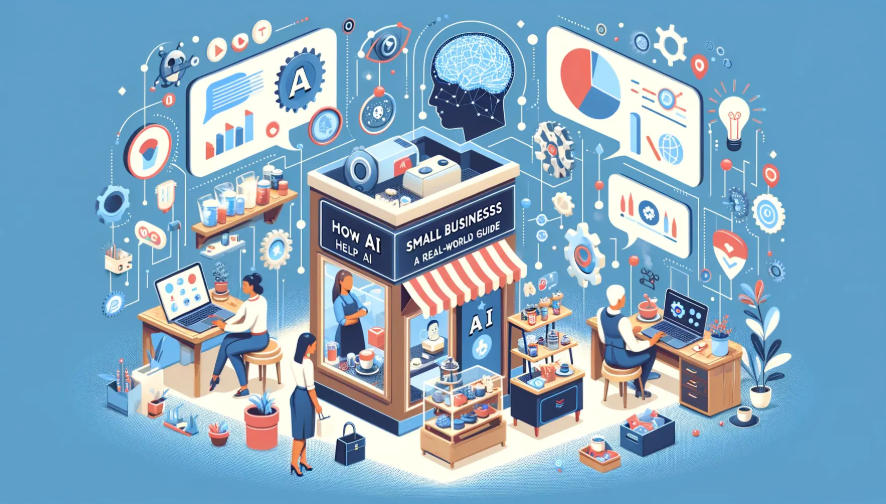Introduction to Artificial Intelligence
Artificial Intelligence (AI) has evolved far beyond its initial use cases in science fiction movies. Today, it is a game-changer for industries across the globe, including small businesses. Small enterprises are adopting AI tools at a rapid pace to enhance their operations, streamline their processes, and offer superior services to their customers. In this article, we will delve into how AI is revolutionizing small businesses, the challenges involved in its implementation, and the future trends to watch out for.
What is Artificial Intelligence?
At its core, AI refers to machines or software systems that can perform tasks that typically require human intelligence. These tasks include learning from experience, recognizing patterns, understanding natural language, and making decisions. AI technologies, such as machine learning (ML), natural language processing (NLP), and robotics, are transforming how businesses operate, especially smaller enterprises with limited resources.
See also: buildingbusinessnews
The Growing Importance of AI for Small Businesses
The rise of AI presents small businesses with new opportunities to increase efficiency, lower costs, and enhance the customer experience. In a world where competition is fierce, small business owners are leveraging AI to remain competitive, offering innovative solutions without the need for significant investments in traditional infrastructure. AI has become more accessible and affordable, making it easier for small businesses to implement and reap the rewards.
Key Ways AI is Transforming Small Businesses
Automation of Routine Tasks
One of the most impactful ways AI is revolutionizing small businesses is through automation. AI-powered tools can take over repetitive and time-consuming tasks, such as data entry, scheduling, and responding to simple customer inquiries. By automating these tasks, small businesses can free up valuable time and resources, allowing employees to focus on more strategic initiatives that drive growth.
AI for Enhanced Customer Experience
AI is playing a vital role in enhancing the customer experience. Through the use of AI-driven chatbots, businesses can offer 24/7 support, answering customer queries instantly and efficiently. Additionally, AI systems can personalize recommendations based on customer behavior, preferences, and past interactions, which leads to higher customer satisfaction and loyalty.
Data-Driven Decision Making with AI
Small businesses often struggle to make data-driven decisions due to limited access to sophisticated analytics tools. AI bridges this gap by providing actionable insights derived from large datasets. With AI, businesses can analyze customer behavior, track sales trends, and even predict future market demands. This enables business owners to make informed decisions that can improve profitability and optimize operations.
AI-Powered Marketing Strategies
Marketing is a crucial aspect of business growth, and AI is changing the way small businesses approach marketing. AI tools can analyze consumer behavior and segment audiences based on various parameters, enabling businesses to create targeted marketing campaigns. Furthermore, AI can optimize ad placements, track customer engagement, and help businesses maximize their return on investment (ROI) in marketing.
Inventory Management and AI Solutions
AI is also enhancing inventory management, an area where small businesses often face challenges. Through AI-powered inventory management systems, businesses can predict demand patterns, optimize stock levels, and reduce waste. AI can also automatically reorder products when stock levels are low, ensuring businesses never run out of critical supplies.
Improving Employee Productivity with AI Tools
Small businesses often have limited staff, making it essential to maximize the productivity of every employee. AI-powered tools can assist employees in managing their workloads more efficiently. From intelligent scheduling systems to AI-based productivity apps, small businesses can ensure their team is working at peak efficiency while minimizing burnout and errors.
Real-Life Examples of AI in Small Businesses
Small Businesses Adopting AI
Many small businesses across the world are already integrating AI into their operations. For example, a small retail store might use AI for personalized marketing and inventory management, while a local restaurant could utilize AI to manage reservations, predict foot traffic, and optimize menus based on customer preferences. These real-life applications demonstrate how AI is helping small businesses across industries streamline operations and enhance customer experiences.
Challenges in Implementing AI for Small Businesses
Cost and Resource Constraints
While AI offers numerous benefits, the implementation of AI tools can be costly, particularly for small businesses with limited budgets. The initial setup, training, and ongoing maintenance costs of AI systems can be a barrier. However, with the emergence of affordable AI solutions and cloud-based platforms, many small businesses are finding it easier to adopt AI without incurring substantial upfront costs.
AI Adoption and Employee Resistance
Another challenge small businesses face is resistance from employees who may feel threatened by automation. However, businesses must communicate that AI is not about replacing workers, but rather enhancing their capabilities. Successful AI adoption often involves training employees to work alongside AI tools, leveraging their skills for more complex tasks.
The Future of AI in Small Business
How AI Will Continue to Evolve in Business
As AI technology continues to evolve, we can expect even more innovative applications in small businesses. AI will become more intuitive, with systems capable of understanding complex human emotions and preferences. Furthermore, AI’s integration with the Internet of Things (IoT) will enable small businesses to automate and control their physical environments more efficiently, driving growth and operational excellence.
Upcoming AI Trends for Small Businesses
Small businesses can look forward to AI advancements such as enhanced voice recognition systems, AI-based cybersecurity tools, and deeper personalization of customer experiences. These trends will allow small businesses to operate with even greater efficiency, intelligence, and customer focus.
Frequently Asked Questions (FAQs)
What AI tools should small businesses start with?
Small businesses should start with tools that address their most pressing needs. Chatbots, automated email marketing platforms, and AI-driven analytics tools are good starting points for enhancing customer experience and decision-making.
Is AI only for tech-savvy businesses?
No, AI has become more user-friendly and accessible for all types of businesses, including those without a technical background. Many AI platforms offer intuitive interfaces and require little to no technical expertise.
How can AI improve customer service in small businesses?
AI can streamline customer service by offering instant responses to common queries through chatbots. It can also personalize customer interactions based on past behavior, leading to better service and customer satisfaction.
What are the initial costs of integrating AI into a small business?
The initial cost varies based on the tools and platforms you choose. However, there are affordable cloud-based AI solutions available for small businesses that can fit within budget constraints.
How can AI help small businesses stay competitive?
AI helps businesses stay competitive by optimizing operations, improving decision-making, and offering personalized experiences to customers. This leads to increased efficiency and customer loyalty, allowing small businesses to thrive in a competitive market.
Is AI accessible for all types of small businesses?
Yes, AI is accessible to small businesses of all types. With the growing number of affordable, cloud-based AI tools, even small mom-and-pop shops can implement AI solutions that enhance their operations.
Conclusion
Embracing AI is no longer just an option for large corporations; it’s a necessity for small businesses aiming to compete and grow in today’s digital economy. Whether it’s automating routine tasks, enhancing customer experiences, or improving decision-making, AI offers small businesses the tools they need to thrive. As AI continues to evolve, small businesses must stay ahead of the curve, leveraging these technologies to drive innovation and deliver exceptional value to their customers.




 The Impact of Remote Work on Global Business Operations
The Impact of Remote Work on Global Business Operations